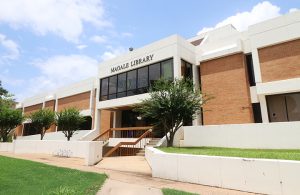Southern Arkansas University’s Supplemental Instruction (SI) program is now the only university in Arkansas to have achieved the honor of certification by the International Center for Supplemental Instruction at the University of Missouri-Kansas City.
“We are striving to achieve a high standard of excellence with our program,” said Sheffield Coulter, SI coordinator at SAU.
Student SI leaders are valuable as they pass their experience in historically challenging courses along to those who need help academically. Leaders are hand-picked by faculty to help students deal with not only content but develop good study habits and strategies and help them get to know other students. SI leaders are chosen not only because they excelled in difficult courses but often because they took advantage of SI sessions themselves.
Dr. Julie Collins, executive director of the International Center for Supplemental Instruction, said SAU has implemented the core elements of SI “to positively impact the students,” and that its practices uphold the SI model.
“It is an honor for our program to be awarded this recognition,” said Eunice Walker, director of SAU’s Student Support Services. “This program helps students become successful, independent learners.”
SI has been available for more than 15 years through Student Support Services. Data shows that students who consistently attend SI earn a higher grade and have a higher GPA upon graduation.
Walker gave special thanks to Coulter, SI leaders, and the SAU community. “They worked diligently to garner this achievement,” she said.
“We are currently the only accredited SI program in the state of Arkansas,” said Coulter. “I attribute this honor to the hard work of our student leaders as well as faculty support.”
She noted that SI leaders “persevered through a shift to online instruction due to COVID-19.”
Coulter credited Drew Glover, director of online learning, as “a huge asset in helping us set up sessions through Blackboard so that we could continue our online sessions and the process of accreditation. We did not miss a week of sessions.”
According to Collins, SI programs “require attention to detail, dedicated time and resources, and a superb student and professional staff. SAU’s leaders are engaged in rigorous planning, are observed by program leadership, and are provided feedback for continual growth.”
Coulter said the decision was made to become an accredited program after training in the fall. “We made changes to lesson planning, observations and our end-of-term report. We obtained faculty support letters, as well.”
The review process was lengthy due to all the components of SI. Lavana Kindle, tutor coordinator for Student Support Services, has long served the program with excellence, making “the process of achieving accreditation much easier,” Coulter said. “We are excited to have our program recognized!”
Student Support Services is a federally-funded program designed to increase the retention and graduation rates and foster an institutional climate supportive of the success of low-income and first generation college students and those with disabilities.
The mission of SAU is to educate students for productive and fulfilling lives in a global environment by providing opportunities for intellectual growth, individual enrichment, skill development, and meaningful career preparation.

